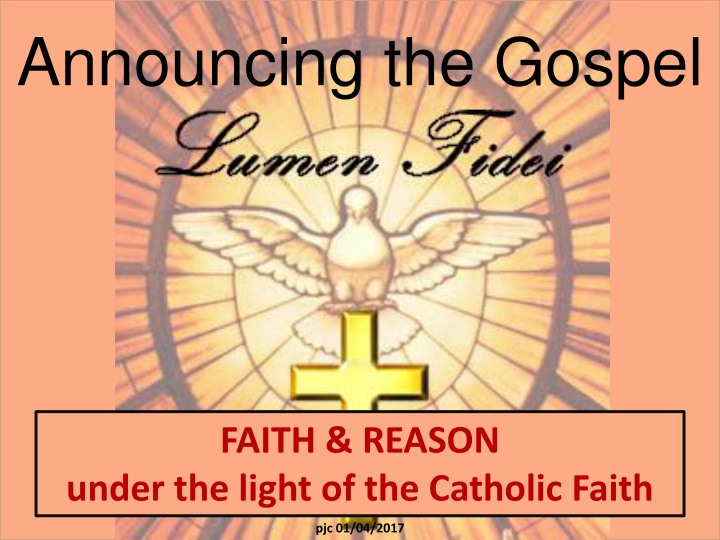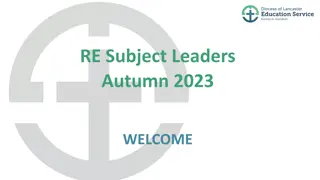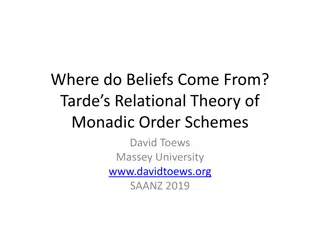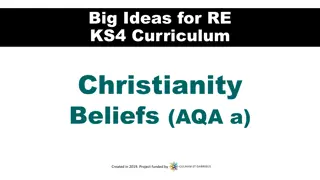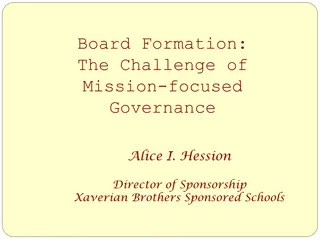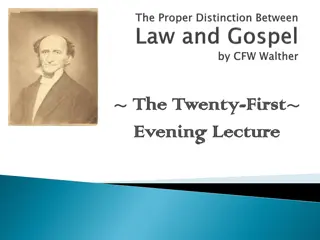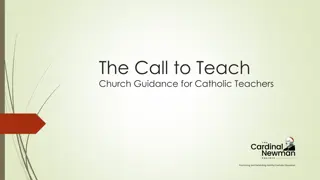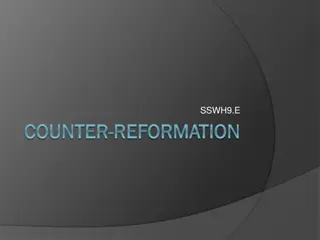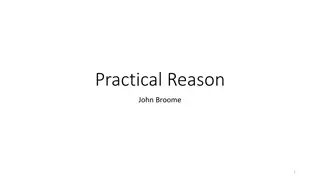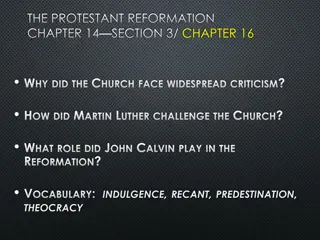Exploring the Relationship Between Faith and Reason in Catholic Beliefs
Understanding the theological virtue of faith and the capacity for reasoning in the context of Catholic teachings. Explore the tension between faith and reason, and the differing perspectives from secular critics and faith-based individuals on the role of faith and reason in society.
Download Presentation

Please find below an Image/Link to download the presentation.
The content on the website is provided AS IS for your information and personal use only. It may not be sold, licensed, or shared on other websites without obtaining consent from the author.If you encounter any issues during the download, it is possible that the publisher has removed the file from their server.
You are allowed to download the files provided on this website for personal or commercial use, subject to the condition that they are used lawfully. All files are the property of their respective owners.
The content on the website is provided AS IS for your information and personal use only. It may not be sold, licensed, or shared on other websites without obtaining consent from the author.
E N D
Presentation Transcript
Announcing the Gospel FAITH & REASON under the light of the Catholic Faith pjc 01/04/2017
What is FAITH? Catechism of the Catholic Church Faith is the theological virtue by which we believe in God and believe all that He has said and revealed to us, and that Holy Church proposes for our belief, because He is truth itself. By faith "man freely commits his entire self to God." For this reason the believer seeks to know and do God's will. "The righteous shall live by faith." Living faith "work[s] through charity. [1814] The gift of faith remains in one who has not sinned against it. But "faith apart from works is dead": when it is deprived of hope and love, faith does not fully unite the believer to Christ and does not make him a living member of his Body. [1815] The disciple of Christ must not only keep the faith and live on it, but also profess it, confidently bear witness to it, and spread it: "All however must be prepared to confess Christ before men and to follow him along the way of the Cross, amidst the persecutions which the Church never lacks." Service of and witness to the faith are necessary for salvation: "So every one who acknowledges me before men, I also will acknowledge before my Father who is in heaven; but whoever denies me before men, I also will deny before my Father who is in heaven. [1816]
What is REASON? Reason is the capacity for consciously making sense of things, applying logic, establishing and verifying facts, and changing or justifying practices, institutions, and beliefs based on new or existing information. It is closely associated with such characteristically human activities as philosophy, science, language, mathematics, and art and is normally considered to be a definitive characteristic of human nature. Reason, or an aspect of it, is sometimes referred to as rationality. Reasoning is associated with thinking, cognition, and intellect. Reasoning may be subdivided into forms of logical reasoning (forms associated with the strict sense): deductive reasoning, inductive reasoning, abductive reasoning; and other modes of reasoning considered more informal, such as intuitive reasoning and verbal reasoning. Along these lines, a distinction is often drawn between discursive reason, reason proper, and intuitive reason, in which the reasoning process however valid tends toward the personal and the opaque. Internet Several sources
Definition of the problem Faith and Reason are generally understood as opposites Faith and Reason are generally understood as opposites There is often a perceived conflict or tension between faith and religion on one hand, and reason and science on the other, as potentially competing sources of wisdom, law and truth. Secular critics position: Accuse religious adherents of irrationality and fanaticism Assert that tolerance, understanding and acceptance belong to the secular world only. When Faith is used as an argument, a significant degree of polarization takes place, accusing faith in a God and its consequences as the greatest divider. Accuse the multiplicity of faiths and religions of the lack of peace and human development in the world even today Accuse faith of multiple historical atrocities in the name of God Faith based critics position: Accuse all secular critics as individualistic, arrogant and soulless as they have replaced God with a new theology centered on man. Don t understand why the secular world can t accept, as rational, arguments that include the idea of a God creator, a God savior, heaven and hell. Explain all problems of current society (abortion, divorce, destruction of the family, lack of respect for authority, wars, drugs, suicide, euthanasia and poverty) by saying that God has been eliminated from our vocabulary, our thoughts, our society, and our lives.
Faith & Reason: History From Christ to Renaissance : Scholastic Approach St. Augustine [s. IV-V]: We believe to understand . Belief must come before understanding. Humankind has a limited capacity to reason, and we should be aware of these limitations and use the authority of God in scripture to find truth. An individual uses their reason to apply what they believe. Thomas Aquinas [s. XIII] Men could conclude that God exists using reason alone. Reason is necessary to decide which authority ought to be believed. Faith comes after reason and then faith allows reason to grow. Faith enables a believer to understand further truths that could not be discovered through reason alone. Reason may enable all humans to know science, but only faith informs us of the ultimate end, goal, purpose, and plan for science. From Renaissance to Today: Humanism (XVI): Humans can solve their own problems through reliance on reason and the scientific method Rationalism (XVII): All knowledge arises from intellectual and deductive reason, rather than from the senses. Empiricism (XVII): Origin of all knowledge is sense experience. Idealism (XVIII): God's existence is necessary postulate specifically for the ideal moral law. Romanticism (XIX): Religion constitutes its own sphere of experience, unrelated to scientific knowledge Socialism (XIX): Religion is the opiate of the people that stops the revolution Existentialism (XIX-XX): Faith & Religion breeds hostility to life, understood broadly as will to power. God is dead 20th century: Positivism, Neo-Existentialism, Neo-Darwinism, Moral Relativism,
Faith & Reason: Models of Interaction The conflict model. Here the aims, objects, or methods of reason and faith seem to be very much the same. Thus when they seem to be saying different things, there is genuine rivalry. This model is thus assumed both by religious fundamentalists, who resolve the rivalry on the side of faith, and scientific naturalists, who resolve it on the side of reason. The incompatibilist model. Here the aims, objects, and methods of reason and faith are understood to be distinct. Compartmentalization of each is possible. Reason aims at empirical truth; religion aims at divine truths. Thus no rivalry exists between them. The weak compatibilist model. Here it is understood that dialogue is possible between reason and faith, though both maintain distinct realms of evaluation and cogency. The strong compatibilist model. Here it is understood that faith and reason have an organic connection, and perhaps even parity. Articles of faith can be demonstrated by reason, either deductively (from widely shared theological premises) or inductively (from common experiences). http://www.iep.utm.edu/faith-re/
Root cause of the problem Three wrong visions for God and Men Humans God Society God Humans Humans Society Society Atheism Theocentrism God in the center No room for rational thinking in morality, law, and truth. Anthropocentrism Men in the center God as a distant presence Men in the center God does not exist. No room for religious thinking in morality, law, and truth.
Christ gave us the right vision The kingdom of God is inside of you (Luke 17:21) God God Men God Humans Family Friends Society Work Leisure Service Christianism Men have God Inside and around Men know God through Faith and Reason Men can see God in all other creatures Men nurture all relationships from their relationship with God Men s destiny and salvation is in God
Integrating Faith & Reason Progressive discernment Beatitudes Faith (poor inspirit, merciful, peacemaker, ) Capital Sins Reason (pride, greed, envy, lust, ) 10 Commandments Instincts (kill, steal, honor, covet, ) The control of our instincts and rational thinking can lead us to live a respectful and acceptable life where we seek our happiness and other people s happiness and common good, a life where we don t kill or steal, a life where we control our pride, greed and envy. But only when we add faith in an all merciful God, and the aspiration of an eternal life with Him, we gain strength and will to consistently live a life of Service to others under the light of the Beatitudes, and ordinary saint life.
Integrating Faith & Reason: A practical model Integrating Faith & Reason: A practical model Listening to your Spirit to decide if Listening to your Spirit to decide if an action is from God an action is from God Does it bring consolation? Or desolation? Happiness Sadness Clarity Confusion Peace Uneasiness Good Evil Once I think that by turning away from God I will find myself, my life begins to fall apart (Lk 15:11-24) Angels Demons Positivity Negativity Life requiring effort Life easy and attractive Life requiring intelligence Life followed blindly Virtues and joy Offense and pain Life fulfilling obligations Life ignoring obligations Life of acceptance Life of rejection Common good Individualism Belongs to God Does not belong to God (St. Ignatius of Loyola)
Conclusion Conclusion
Importance of the debate between Faith & Reason today The critical issues to address are many and difficult: The need for evangelization in a post-modern secular world The progressive destruction of Christian thought The lack of interest in faith The lack of sound and fruitful debates between science and religion The raise of fundamentalism The corrosion from Moral Relativism To be impactful, Catholic teaching must involve arguments where faith and reason complement each other, following the strong compatibilist model. This requires a deep preparation by the evangelizer to be able to engage both secular and faith-based audience. Evangelizers must combine two goals effectively: be light to the world (Lumen Gentium) and be defender of the faith (Deffensor Fidei) -> LUMEN FIDEI.
LUMEN FIDEI Faith: supernatural gift from God The Light of the Faith (LUMEN FIDEI) illumines our journey in life and provides clarity to all aspects of human existence in our way to eternal life with God. Faith becomes a light for our way, guiding our journey through time. Through Faith, we: Accept God s word as a solid rock upon which we can build. Accept God s word as a straight highway on which we can travel. Learn that we are born of an encounter with the living God who calls us God reveals His love. Gain a support to lean for security and for building our lives. Receive fresh vision, new eyes to see. Obtain a great promise of fulfilment. See a vision of the future that opens up before us. Understand the depths of our beings. Acknowledge the wellspring of goodness at the origin of all things. Realize that our lives are the fruit of a personal call and a personal love. Encyclical Lumen Fidei Benedict XVI / Francis 06/29/2013
LUMEN FIDEI Faith: supernatural gift from God connected to Reason Faith liberates reason in so far as it allows reason to attain correctly what it seeks to know and to place it within the ultimate order of things, in which everything acquires true meaning. (St. John Paul II in Fides & Ratio[20]) The fear of the Lord is the beginning of knowledge (Prov 1:7; cf. Sir 1:14) Faith is not some mystical, unexplainable conviction arrived at without evidence. Come now, and let us reason together, saith the Lord (Isaiah 1:18) Faith is a conviction arrived at by examining the evidence and accepting the most reasonable conclusion. (Rom 1:20; 10:17; Heb 11:1) Encyclical Lumen Fidei Benedict XVI / Francis 06/29/2013
LUMEN FIDEI Remember Jesus teachings on Faith Jn 12:46 -> "I have come as light into the world, that whoever believes in me may not remain in darkness" (Jn 12:46) Matthew 16:15-> Jesus asked. Who do you say I am? Simon Peter answered, You are the Christ, the Son of the living God. John 14:6 -> I am the way and the truth and the life. No one comes to the Father except through Me John 11:26-> Jesus said to her, I am the resurrection and the life. [ ] And everyone who lives and believes in Me will never die. John 12:44-> Then Jesus cried out, Whoever believes in Me does not believe in Me alone, but in the One who sent Me. And whoever sees Me sees the One who sent Me Mark 9:23 -> All things are possible to him who believes! Matthew 17:20-> "For truly I tell you, if you have faith the size of a mustard seed, you can say to this mountain, 'Move from here to there , and it will move. Nothing will be impossible for you. John 11:40 -> Jesus replied, "Did I not tell you that if you believed, you would see the glory of God?"
LUMEN FIDEI Pope s reflection Faith without truth does not save, it does not provide a sure footing. It remains a beautiful story, the projection of our deep yearning for happiness, something capable of satisfying us to the extent that we are willing to deceive ourselves. Either that, or it is reduced to a lofty sentiment which brings consolation and cheer, yet remains prey to the vagaries of our spirit and the changing seasons, incapable of sustaining a steady journey through life. Encyclical Lumen Fidei Popes Benedict XVI - Francis
Final Prayer Final Prayer
LUMENFIDEI - PRAYER OF THE SEVEN QUESTIONS OF JESUS for personal meditation 1.What are you looking for? (John 1:38) JESUS IS THE TRUTH, THE WAY AND THE LIFE And when the two disciples heard [John the Baptist] say this, they followed Jesus. Jesus turned around and saw them following. What are you looking for? He asked. They said to Him, Teacher, where are You staying? Come and see, He replied. So, they went and saw where He was staying, and spent that day with Him. 2.Who do you say that I am? (Matt 16:15) JESUS IS THE SON OF GOD But what about you? Jesus asked. Who do you say I am? Simon Peter answered, You are the Christ, the Son of the living God. 3.What do you want me to do for you? (Matt 20:32) JESUS IS THE HEALER The crowd chided them to be silent, but they shouted all the louder, Lord, Son of David, have mercy on us! Jesus stopped and called them. What do you want Me to do for you? He asked. Lord, they answered, let our eyes be opened. 4.How are you to avoid being sentenced to hell? (Matt 23:33) JESUS IS SALVATION How will you escape the sentence of hell? Because of this, I am sending you prophets and wise men and teachers. [ ] many will fall away and will betray and hate one another, and many false prophets will arise and mislead many. Because of the multiplication of wickedness, the love of most will grow cold. But the one who perseveres to the end will be saved. 5.Why do you persecute me? (Acts 9:4-6) JESUS IS SACRIFICE AND OBEDIENCE And he fell to the ground and heard a voice saying to him, Saul, Saul, why are you persecuting Me? And he said, Who are You, Lord? And He said, I am Jesus whom you are persecuting, but get up and enter the city, and it will be told you what you must do. 6.Do you love me? (John 21:16) JESUS IS LOVE Jesus asked a second time, Simon son of John, do you love Me? Yes, Lord, he answered You know I love You. Jesus told him, Shepherd my sheep. Feed my sheep 7.Why do you doubt? (Matt 14:31) JESUS IS FAITH and HOPE But when he saw the strength of the wind, he was afraid, and beginning to sink, cried out, Lord, save me! Immediately Jesus reached out His hand and took hold of Peter. You of little faith, He said, why did you doubt? And when they had climbed back into the boat, the wind died down.
The End The End
